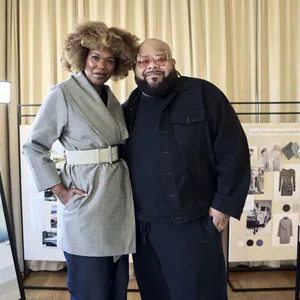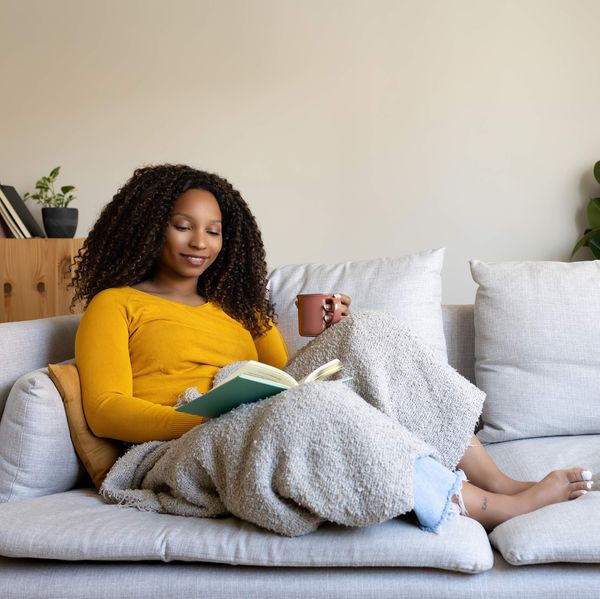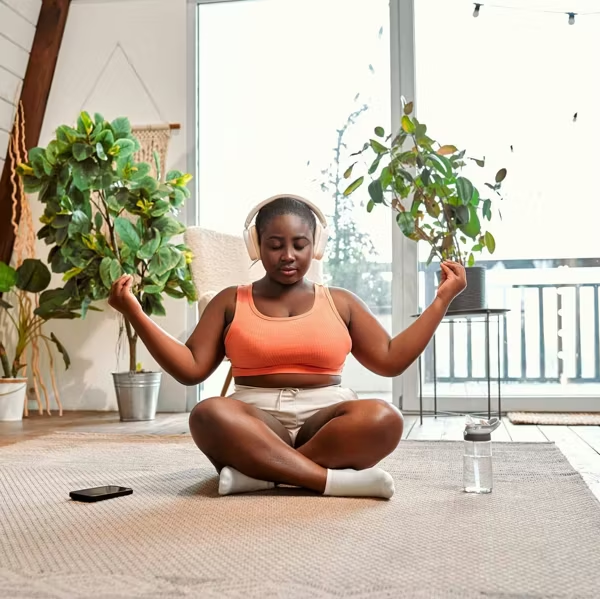It's kinda crazy. "It" being that, while this year is showing out in a billion different ways, on many levels, I feel more peaceful than I ever have. One day, maybe I'll get into how I know a big part of that came from removing some people, places, things, and ideas (boundaries; boundaries are good, y'all) that were no longer serving me—and, more importantly, where I am headed. Yet, my inner peace goes even beyond that.
For about 12 years now, I've been on the tip of collecting things. Each year, it's something that symbolizes where I'm at and "what I'm on" at the moment. This past year, it was puzzle pieces. They symbolize that I am a puzzle piece that "fits" some places and doesn't fit others. My job isn't to try and force my "piece" into any picture (because that could damage the piece and pic, simultaneously) but to welcome where I fit and be at peace with where I don't. And you know what? Living like this has brought about inner tranquility that is unshakeable, no matter how chaotic things seem to be right through here. Or ever.
Just know that whatever is trying to shake you to your core, there is a way to maintain peace in the midst of it. Here are some suggestions that have worked for me.
Create Your Own “Bubble”

When I took my required birthing class (which was Hypnobabies) in order to become a doula, one of my favorite techniques, that I tend to recommend, even to women who aren't pregnant, is what is known as the "bubble of peace". Anyone who's been pregnant before knows that people tend to have an abundance of opinions, perspectives and information about what they think a new mother should and shouldn't do, both during her pregnancy and after she gives birth. By creating a bubble of peace, she is able to tune out anyone and anything that is triggering her or stressing her out.
At the end of the day, it's basically about meditating and centering in on thoughts that make you feel calm and peaceful. And I promise you that if you make it a priority to cultivate your own, it can help you to tune out life's background noise so that you can focus on what your mind, body and spirit are telling you that you need, at any given time—even if what they need is for you to simply chill out and do absolutely nothing.
Take News (and Phone) Breaks

Something that I've learned about myself throughout the years is that I have a really high threshold for information. What I mean by that is, it takes me a while—months even—to get to a point where I'm like, "OK, I've had enough" (although 2020 has definitely been testing me in this way!). But boy, when I first saw the footage of George Floyd being murdered by those cops, I broke. I cried. I had to shut the news cycle down for a minute. I had had enough.
You can read articles like TIME's "You Asked: Is It Bad for You to Read the News Constantly?" to know that there is no way around the fact that constantly taking in the news (or info, period), whether it's online or off, will not only elevate your stress levels but it can cause you to fall into the rut of constantly seeing things from a "glass half empty perspective". Same thing goes for always talking on the phone, especially if it's with family members or friends who consistently err on the side of negativity. That's why it's so important to take intentional breaks from the news and your phone. Turn off your notifications. Put your phone on silent. Then read a book. Watch a movie. Listen to music. Take a nap. Do something that will totally get your mind off of all that's going on in the world. Chile, Daily Mail, Black Twitter and your cynical auntie ain't going nowhere. They'll all be right where you left them—whenever you decide to come back.
Be on Your Own Time Schedule

Ecclesiastes 1:9 tells us that there is nothing new under the sun. So yeah, whenever seniors in my life try and act like it's only this generation that is wilin' out, I remind them of what the Good Book says. The difference now is thanks—or maybe no thanks—to things like the internet and camera phones, we're constantly in the loop of what's going on…pretty much all over the globe. And since things seem to be always moving at such a rapid pace, it can tempt us to speed up when it comes to how our own lives are flowing. Please don't fall for that trap. Rushing can cause you to make unnecessary mistakes. Rushing can bring about feelings of anxiety. Rushing can stop you from truly connecting with others. Rushing can prevent you from getting the clarity that you need. Rushing can hinder you from living in the moment.
While I'm sharing Scripture, Matthew 6:34(NKJV) states, "Therefore do not worry about tomorrow, for tomorrow will worry about its own things. Sufficient for the day is its own trouble." Those are words of wisdom from Christ himself. What he was basically saying is, all you've really and truly got is right here and now. Slow down. Take it in. Do what is relevant in order to bring out the best in this present moment.
Should you plan ahead? Sure. All responsible people do. Yet should you worry about what you can't control in the future or even be in a rush to get there? Nope. Not if you desire true inner peace, you shouldn't, anyway.
Find a “Vent” Partner
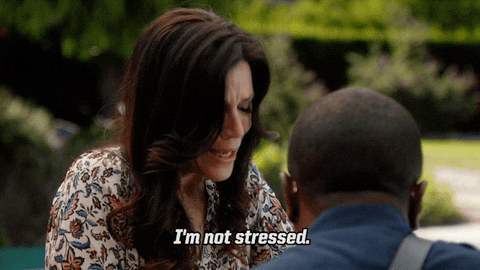
There is a particular person in my life who is basically my vent partner. I'm not sure how we got to the point and place of being that for one another, but the "position" requires being on-call—whenever. When she's about the spaz TF out, she calls me. When I need to ramble, cuss or sometimes even scream, she's there. The cool thing about having this type of individual in your life is there are a safe place (because they don't share your vents nor "judge" you for them) to get out your initial frustrations so that you can calm down and do, whatever it is that you're about to do (or not do), from a less emotional and more logical and practical space.
Sometimes, the reason why we feel so unsettled when it comes to what's going on around us is it seems like we're not being heard or validated when it comes to how we feel about things. A vent partner fills this void so that we know we're supported, which makes us feel more capable to endure…whatever it is that needs to be.
Do What Makes You Happy
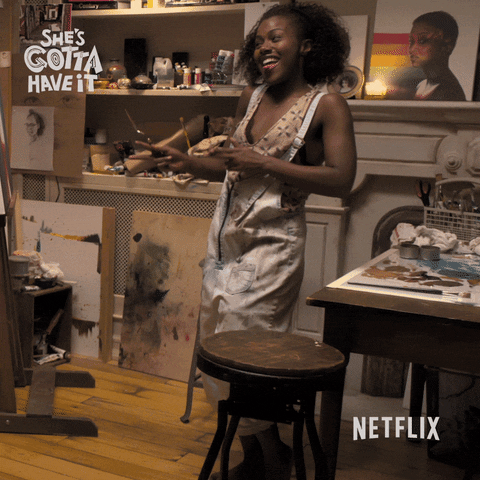
Happiness. Remember that? When I was recently reading an article on how some researchers define what it truly means to be a happy individual, I liked that it said, "It's not about smiling all the time nor does it stem from money or health, but a self-belief you are on the road you want to be on." The beauty in that resolve is, no matter what is happening around you, in many ways, you have the power to choose what path you want to be on; not just long-term but in the now. So, what would make you happy, right at this very second? Some Ben & Jerry's ice cream (shout out to them and their consistent support of the Black Lives Matter movement)? A glass of wine? Catching up with an old friend? Some hanging-off-of-the-chandelier sex with your partner? Playing with your kids. Doing an arts and crafts project? Writing? Singing? Podcasting? What?
Making the conscious decision to be like, "You know what? No matter what y'all are doing, I'm going to take out a moment and do what makes me happy", is not about being selfish or even insensitive. As the article that I referenced said, it's about putting yourself on a particular path. And anything that makes you feel happy can help to make you feel content…which can help to make you feel more centered and secure…which can definitely help to make you feel more peaceful.
Remember You’re Here “For Such a Time As This”
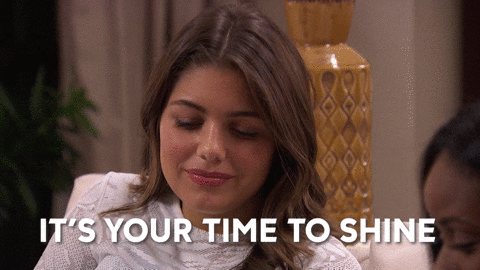
If you read the story of Esther in the Bible, there is a line from something that her cousin, Mordecai said that goes like this—"Yet who knows whether you have come to the kingdom for such a time as this?" (Esther 4:14—NKJV) It was his way of reminding Esther that, even though saving her people was going to be quite a daunting task, the fact that she existed in a time when Jews needed deliverance was not a happenstance thing. In this present time, the same goes for me and the same goes for you. While I'm sure you've had multiple, "What in the world is going on?!" moments, probably at least a dozen times this week alone, it's not a "random" thing that you exist. There is something about your gifts, talents, personality, perspective and mere existence that is oh so very necessary—right here and right now. Knowing that you—as Whoopi Goldberg once said in an episode of A Different World—"are a voice in this world", who can make an impact like no one who came before you or will come after you can, should bring a peace like nothing else.
Because if you didn't serve a purpose, you wouldn't be here; you'd be unnecessary. You are here, though. And that's something to feel really good, resolved and totally at peace about. Here's praying that you do.
Want more stories like this? Sign up for our newsletter here to receive our latest articles and news straight to your inbox.
Featured image by Shutterstock


